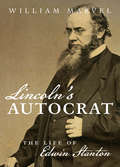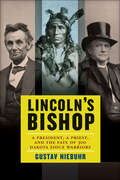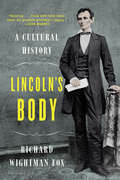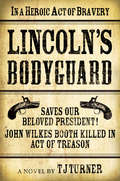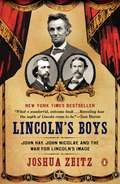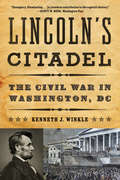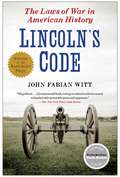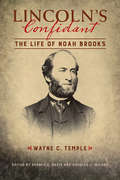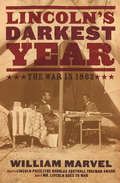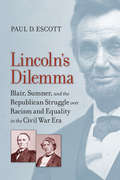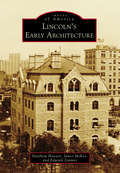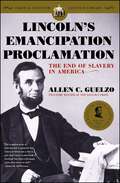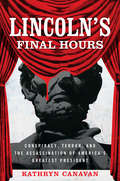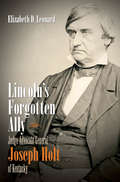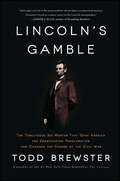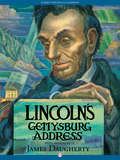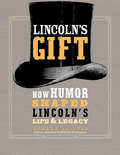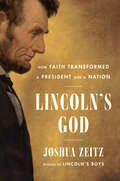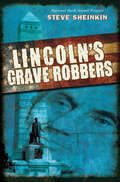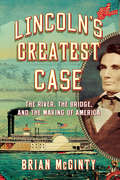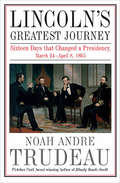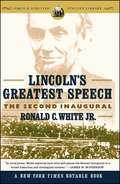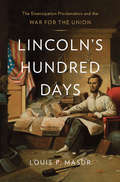- Table View
- List View
Lincoln's Autocrat: The Life of Edwin Stanton (Civil War America #1)
by William MarvelEdwin M. Stanton (1814-1869), one of the nineteenth century's most impressive legal and political minds, wielded enormous influence and power as Lincoln's Secretary of War during most of the Civil War and under Johnson during the early years of Reconstruction. In the first full biography of Stanton in more than fifty years, William Marvel offers a detailed reexamination of Stanton's life, career, and legacy. Marvel argues that while Stanton was a formidable advocate and politician, his character was hardly benign. Climbing from a difficult youth to the pinnacle of power, Stanton used his authority--and the public coffers--to pursue political vendettas, and he exercised sweeping wartime powers with a cavalier disregard for civil liberties. Though Lincoln's ability to harness a cabinet with sharp divisions and strong personalities is widely celebrated, Marvel suggests that Stanton's tenure raises important questions about Lincoln's actual control over the executive branch. This insightful biography also reveals why men like Ulysses S. Grant considered Stanton a coward and a bully, who was unashamed to use political power for partisan enforcement and personal preservation.
Lincoln's Bishop: A President, A Priest, and the Fate of 300 Dakota Sioux Warriors
by Gustav NiebuhrA history of the Dakota War of 1862, an Episcopal bishop, and his campaign to protect the lives of the Dakota Sioux.It is hard to recall what powerful moral voices Protestant church leaders had in the formative years of the nation. Gustav Niebuhr travels back to the Minnesota frontier of 1862 when Dakota Sioux rose up against pioneering families and slaughtered hundreds. Citizens demanded mass executions and deportations. Into this turmoil stepped Henry Benjamin Whipple, the state’s first Episcopal bishop.Whipple had already loudly decried the crimes and corruption of those managing Indian affairs and warned of calamity. Now he made the case of mercy and a deeper justice, which eventually led to meeting with President Lincoln. Despite being preoccupied with the Civil War, Lincoln was moved to intervene, surprisingly taking the time to review all 303 cases and overturning the death sentence for most of the Indians. Nevertheless, the result was still the largest single execution on American soil.If not for Whipple’s vigorous campaigning, both in state and in Washington, DC, a greater tragedy might well have occurred. His success should haunt us: Where today do we hear these trumpet calls for justice like those given by figures such as Bishop Henry Benjamin Whipple?“[An] enlightening tale of Abraham Lincoln’s other war. . . . A pleasant surprise for the average history buff.” —Kirkus Reviews
Lincoln's Body: A Cultural History
by Richard Wightman FoxEven two hundred years after Abraham Lincoln's death, we, like Walt Whitman, "love the President personally." In a stunning feat of scholarship, insight, and engaging prose, Lincoln's Body explores how a president ungainly in body and downright "ugly" of aspect came to mean so much to us. The very roughness of Lincoln's appearance made him seem all the more common, one of us--as did his sense of humor about his own awkward physical nature. Nineteenth-century African Americans felt deep affection for their "liberator" as a "homely" man who did not hold himself apart. During Reconstruction, Southerners felt a nostalgia for the humility of Lincoln, whom they envisioned as a "conciliator." Later, teachers glorified Lincoln as a symbol of nationhood that would appeal to poor immigrants. Monument makers focused not only on the man's gigantic body but also on his nationalist efforts to save the Union, downplaying his emancipation of the slaves. Among both black and white liberals in the 1960s and 1970s, Lincoln was derided or fell out of fashion. More recently, Lincoln has once again been embodied (as both idealist and pragmatist, unafraid of conflict and transcending it) by outstanding historians, by self-identified Lincolnian president Barack Obama, and by actor Daniel Day-Lewis--all keeping Lincoln alive in a body of memory that speaks volumes about our nation.
Lincoln's Bodyguard: In A Heroic Act Of Bravery Saves Our Beloved President! John Wilkes Booth Killed In Act Of Treason (Lincoln's Bodyguard Series #2)
by Tj Turner2016 International Book Award Winner Fiction: HistoricalIn Lincoln's Bodyguard, an alternative version of American history, President Lincoln is saved from assassination. Though he prophesied his own death the only way he believed the South would truly surrender Lincoln never accounted for the heroics of his bodyguard, Joseph Foster. A biracial mix of white and Miami Indian, Joseph makes an enemy of the South by killing John Wilkes Booth and preventing the death of the president. His wife is murdered and his daughter kidnapped, sending Joseph on a revenge-fueled rampage to recover his daughter. When his search fails, he disappears as the nation falls into a simmering insurgency instead of an end to the War. Years later, Joseph is still running from his past when he receives a letter from Lincoln pleading for help. The President has a secret mission. Pursued from the outset, Joseph turns to the only person who might help, the woman he abandoned years earlier. If he can win Molly over, he might just fulfill the President s urgent request, find his daughter, and maybe even hasten the end of the War.
Lincoln's Boys
by Joshua ZeitzA timely and intimate look into Abraham Lincoln’s White House through the lives of his two closest aides and confidants Lincoln’s official secretaries John Hay and John Nicolay enjoyed more access, witnessed more history, and knew Lincoln better than anyone outside of the president’s immediate family. Hay and Nicolay were the gatekeepers of the Lincoln legacy. They read poetry and attendeded the theater with the president, commiserated with him over Union army setbacks, and plotted electoral strategy. They were present at every seminal event, from the signing of the Emancipation Proclamation to Lincoln’s delivery of the Gettysburg Address-and they wrote about it after his death. In their biography of Lincoln, Hay and Nicolay fought to establish Lincoln’s heroic legacy and to preserve a narrative that saw slavery-not states’ rights-as the sole cause of the Civil War. As Joshua Zeitz shows, the image of a humble man with uncommon intellect who rose from obscurity to become a storied wartime leader and emancipator is very much their creation. Drawing on letters, diaries, and memoirs, Lincoln’s Boys is part political drama and part coming-of-age tale-a fascinating story of friendship, politics, war, and the contest over history and remembrance. .
Lincoln's Citadel: The Civil War in Washington, DC
by Kenneth J. WinkleThe stirring history of a president and a capital city on the front lines of war and freedom. In the late 1840s, Representative Abraham Lincoln resided at Mrs. Sprigg's boardinghouse on Capitol Hill. Known as Abolition House, Mrs. Sprigg's hosted lively dinner-table debates of antislavery politics by the congressional boarders. The unusually rapid turnover in the enslaved staff suggested that there were frequent escapes north to freedom from Abolition House, likely a cog in the underground railroad. These early years in Washington proved formative for Lincoln. In 1861, now in the White House, Lincoln could gaze out his office window and see the Confederate flag flying across the Potomac. Washington, DC, sat on the front lines of the Civil War. Vulnerable and insecure, the capital was rife with Confederate sympathizers. On the crossroads of slavery and freedom, the city was a refuge for thousands of contraband and fugitive slaves. The Lincoln administration took strict measures to tighten security and established camps to provide food, shelter, and medical care for contrabands. In 1863, a Freedman's Village rose on the grounds of the Lee estate, where the Confederate flag once flew. The president and Mrs. Lincoln personally comforted the wounded troops who flooded wartime Washington. In 1862, Lincoln spent July 4 riding in a train of ambulances carrying casualties from the Peninsula Campaign to Washington hospitals. He saluted the "One-Legged Brigade" assembled outside the White House as "orators," their wounds eloquent expressions of sacrifice and dedication. The administration built more than one hundred military hospitals to care for Union casualties. These are among the unforgettable scenes in Lincoln's Citadel, a fresh, absorbing narrative history of Lincoln's leadership in Civil War Washington. Here is the vivid story of how the Lincoln administration met the immense challenges the war posed to the city, transforming a vulnerable capital into a bastion for the Union.
Lincoln's Code
by John Fabian WittIn the fateful closing days of 1862, three weeks before Emancipation, the administration of Abraham Lincoln commissioned a code setting forth the laws of war for the armies of the United States. The code announced standards of civilized conduct in wartime concerning issues such as torture, prisoners of war, civilians, spies, and slaves. The code Lincoln approved ultimately shaped the course of the Civil War. And when the war was over, the same code reshaped warfare the world over. By the twentieth century, the 157 articles of Lincoln's code had become the basis of a new international law of war. European powers adopted the American code. International agreements like the Geneva Conventions incorporated and expanded it. In this pathbreaking and deeply original book, John Fabian Witt tells the hidden story of the laws of war in the first century of the United States-and of the extraordinary code that emerged from it to change the course of world history. Lincoln's Code is the haunting and inspiring story of an idea in American history: the idea that conduct in war can be regulated by law. For many, the very idea of a law for war has seemed like an oxymoron. But with sweep and vitality, Witt unfolds the story of the cast of characters who invented the modern laws of war. Washington, Jefferson, and Franklin championed Enlightenment rules for civilized warfare. James Madison went to war in 1812 to vindicate them. Indian conflicts challenged and distorted them. The Mexican War quietly revolutionized them. In the Civil War, Lincoln and a small band of now forgotten figures helped remake those same laws to support Emancipation and advance the Union war effort. Three decades later, a new generation of Americans went into a war of American empire in the Philippines equipped with the very rules Lincoln had laid down. In beautifully crafted prose, Witt brings to life the soldiers and the presidents, the war makers and the pacifists, the Indians and the slaves, the cynics, the utopians, and the pragmatists who struggled with enemies and with one another to shape the United States' vision of the laws of war. A narrative of expansive range and significance, Lincoln's Code depicts the drama of armed conflict and the anguish of human beings grappling with such vexing questions as whether prisoners could be executed; whether there were rules in Indian wars; whether military commissions could try unlawful combatants; whether torture might ever be justified; and whether slaves could be freed in wartime. The code Lincoln issued prohibited cruelty and the infliction of pain for its own sake but left room for vast destruction in the name of a just cause. It condoned the devastation inflicted in Sherman's march to the sea. Yet it also provided a moral foundation for Emancipation and insisted that doing the right thing in situations of grave crisis was indispensable to the legitimacy of modern armies. Witt's engrossing exploration of the dilemmas at the heart of the laws of war is a prehistory of our own era. Today the world once again confronts raging legal and moral controversy over the conduct of war. Lincoln's Code reveals that the controversies of the twenty-first century have roots going back to the beginnings of American history. In a time of heated controversy about the nation's conduct in wartime, Lincoln's Code is a compelling story of ideals under pressure and a landmark contribution to our understanding of the American experience.
Lincoln's Code: The Laws of War in American History
by John Fabian WittPulitzer Prize FinalistBancroft Prize WinnerABA Silver Gavel Award WinnerA New York Times Notable Book of the YearIn the closing days of 1862, just three weeks before Emancipation, the administration of Abraham Lincoln commissioned a code setting forth the laws of war for US armies. It announced standards of conduct in wartime--concerning torture, prisoners of war, civilians, spies, and slaves--that shaped the course of the Civil War. By the twentieth century, Lincoln's code would be incorporated into the Geneva Conventions and form the basis of a new international law of war. In this deeply original book, John Fabian Witt tells the fascinating history of the laws of war and its eminent cast of characters--Washington, Jefferson, Franklin, Madison, and Lincoln--as they crafted the articles that would change the course of world history. Witt's engrossing exploration of the dilemmas at the heart of the laws of war is a prehistory of our own era. Lincoln's Code reveals that the heated controversies of twenty-first-century warfare have roots going back to the beginnings of American history. It is a compelling story of ideals under pressure and a landmark contribution to our understanding of the American experience.
Lincoln's Confidant: The Life of Noah Brooks (The Knox College Lincoln Studies Center)
by Douglas L. Wilson Rodney O. Davis Wayne C. TempleAcclaimed as one of the great Lincoln scholars, Wayne C. Temple offers the long-awaited first biography of Noah Brooks, the influential Illinois journalist who championed Abraham Lincoln in state politics and became his almost daily companion during the Civil War. Best remembered as one of the president's few true intimates, Brooks was also a nationally recognized man of letters who mingled with the likes of Mark Twain and Bret Harte. Temple draws on archives and papers long thought lost to re-create Brooks's colorful life and relationship with Lincoln. Brooks's closeness to the president made him privy to Lincoln's thoughts on everything from literature to spirituality. Their frank conversations contributed to the wealth of journalism and personal observations that still make Brooks a much-quoted source for biographers, historians, and Lincoln aficionados. A grand history and unparalleled scholarly resource, Lincoln's Confidant is the story of an extraordinary friendship by one of the giants of Lincoln scholarship.
Lincoln's Darkest Year: The War in 1862
by William MarvelA portrait of a pivotal chapter in the Civil War, &“featuring scheming politicians, bumbling generals, and an increasingly disheartened Northern public&” (Brooks Simpson, author of Ulysses S. Grant: Triumph Over Adversity, 1822–1865). In Mr. Lincoln Goes to War, award-winning historian William Marvel focused on President Abraham Lincoln&’s first year in office. In Lincoln&’s Darkest Year, he paints a picture of 1862—again relying on recently unearthed primary sources and little-known accounts to offer newfound detail of this tumultuous period. Marvel highlights not just the actions but also the deeper motivations of major figures, including Gen. Ulysses S. Grant, Jefferson Davis, George B. McClellan, Stonewall Jackson, and, most notably, Lincoln himself. As the action darts from the White House to the battlefields and back, the author sheds new light on the hardships endured by everyday citizens and the substantial and sustained public opposition to the war. Combining fluid prose and scholarship with the skills of an investigative historical detective, Marvel unearths the true story of our nation&’s greatest crisis.
Lincoln's Dilemma: Blair, Sumner, and the Republican Struggle over Racism and Equality in the Civil War Era (A Nation Divided: Studies in the Civil War Era)
by Paul D. EscottThe Civil War forced America finally to confront the contradiction between its founding values and human slavery. At the center of this historic confrontation was Abraham Lincoln. By the time this Illinois politician had risen to the office of president, the dilemma of slavery had expanded to the question of all African Americans' future. In this fascinating new book Paul Escott considers the evolution of the president's thoughts on race in relation to three other, powerful--and often conflicting--voices. Lincoln's fellow Republicans Charles Sumner and Montgomery Blair played crucial roles in the shaping of their party. While both Sumner and Blair were opposed to slavery, their motivations reflected profoundly different approaches to the issue. Blair's antislavery stance stemmed from a racist dedication to remove African Americans from the country altogether. Sumner, in contrast, opposed slavery as a crusader for racial equality and a passionate abolitionist. Lincoln maintained close personal relationships with both men as he wrestled with the slavery question. In addition to these antislavery voices, Escott also weaves into his narrative the other extreme, of which Lincoln was politically aware: the virulent racism and hierarchical values that motivated not only the Confederates but surprisingly many Northerners and which were embodied by the president's eventual assassin, John Wilkes Booth. Sumner, Blair, and violent racists like Booth each represent forces with which Lincoln had to contend as he presided over a brutal civil war and faced the issues of slavery and equality lying at its root. Other books and films have provided glimpses of the atmosphere in which the president created his Emancipation Proclamation. Lincoln's Dilemma evokes more fully and brings to life the men Lincoln worked with, and against, as he moved racial equality forward.A Nation Divided: Studies in the Civil War Era
Lincoln's Early Architecture (Images of America)
by James Mckee Matthew Hansen Edward ZimmerLincoln's predecessor, Lancaster, formed in 1863 on the east bank of Salt Creek around a proposed Methodist female seminary. Though a building was erected, the school failed to materialize. When Nebraska became the 37th state in 1867, the village of Lancaster was chosen as its first capital, and the name was changed to Lincoln. Although lacking mineral resources, a navigable stream, a railroad, or even a minimal population, the village steadily grew and prospered from its 30 original inhabitants to its present population of more than 260,000. At the time of its origins, critics claimed, "Nobody will ever go to Lincoln who does not go to the legislature, the lunatic asylum, the penitentiary, or some of the state institutions." Images of America: Lincoln's Early Architecture traces the city's growth, including three state capitols and the University of Nebraska, into a modern city of diverse people, events, and businesses.
Lincoln's Emancipation Proclamation: The End of Slavery in America
by Allen C. GuelzoOne of the nation's foremost Lincoln scholars offers an authoritative consideration of the document that represents the most far-reaching accomplishment of our greatest president. No single official paper in American history changed the lives of as many Americans as Lincoln's Emancipation Proclamation. But no American document has been held up to greater suspicion. Its bland and lawyerlike language is unfavorably compared to the soaring eloquence of the Gettysburg Address and the Second Inaugural; its effectiveness in freeing the slaves has been dismissed as a legal illusion. And for some African-Americans the Proclamation raises doubts about Lincoln himself. Lincoln's Emancipation Proclamation dispels the myths and mistakes surrounding the Emancipation Proclamation and skillfully reconstructs how America's greatest president wrote the greatest American proclamation of freedom.
Lincoln's Ethics
by Thomas L. CarsonUnlike many important leaders and historical figures, Abraham Lincoln is generally regarded as a singularly good and morally virtuous human being. Lincoln's Ethics assesses Lincoln's moral character and his many morally fraught decisions regarding slavery and the rights of African-Americans, as well as his actions and policies as commander in chief during the Civil War. Some of these decisions and policies have been the subject of considerable criticism. Lincoln undoubtedly possessed many important moral virtues, such as kindness and magnanimity, to a very high degree. Despite this, there are also grounds to question the goodness of his character. Many fault him as a husband, father and son, and many claim that he was a racist. Carson explains Lincoln's virtues and assesses these criticisms.
Lincoln's Final Hours: Conspiracy, Terror, and the Assassination of America's Greatest President
by Kathryn Canavan&“Will startle and enthrall even the most hard-core of Lincoln aficionados.&” ―Erik Larson, #1 New York Times–bestselling author of The Splendid and the Vile When John Wilkes Booth fired his derringer point-blank into President Abraham Lincoln's head, he set in motion a series of dramatic consequences that would upend the lives of ordinary Washingtonians and Americans alike. In a split second, the story of a nation was changed. During the hours that followed, America's future would hinge on what happened in a cramped back bedroom at Petersen&’s Boardinghouse, directly across the street from Ford&’s Theatre. There, a twenty-three-year-old surgeon—fresh out of medical school—struggled to keep the president alive while Mary Todd Lincoln moaned at her husband&’s bedside. Lincoln&’s Final Hours takes a magnifying glass to the last moments of the president&’s life and the impact his murder had on a country still reeling from a bloody civil war. This fast-paced, thoroughly researched account not only furnishes a glimpse into John Wilkes Booth&’s personal and political motivations but illuminates the stories of ordinary people whose lives were changed forever by the assassination.Lincoln's Final Hours moves beyond the well-known traditional accounts of the assassination, offering readers a front-row seat to the drama and horror of Lincoln&’s death by putting them in the shoes of the audience in Ford&’s Theatre that dreadful evening. Through careful narration of the twists of fate that placed the president in harm&’s way, of the plotting conversations Booth had with his accomplices, and of the immediate aftermath of the assassination, Kathryn Canavan illustrates how a single night changed the course of history.
Lincoln's Forgotten Ally: Judge Advocate General Joseph Holt of Kentucky
by Elizabeth D. LeonardJoseph Holt, the stern, brilliant, and deeply committed Unionist from Kentucky, spent the first several months of the American Civil War successfully laboring to maintain Kentucky's loyalty to the Union, then went on to serve as President Lincoln's judge advocate general. InLincoln's Forgotten Ally, Elizabeth Leonard offers the first full-scale biography of Holt, who has long been overlooked and misunderstood by historians and students of the war. In his capacity as the administration's chief arbiter and enforcer of military law, Holt strove tenaciously, often against strong resistance, to implement Lincoln's wartime policies, including emancipation. After Lincoln's assassination, Holt accepted responsibility for pursuing and bringing to justice everyone involved in John Wilkes Booth's conspiracy. It was because of this role, in which he is often portrayed as a brutal prosecutor, and because of his hard position toward the South, Leonard contends, that Holt's reputation suffered. Leonard argues, however, that Holt should not be defined by what Southern sympathizers and proponents of the Lost Cause came to think of him. Lincoln's Forgotten Allyseeks to restore Holt, who dedicated both his energy and his influence to ensuring that the Federal victory would bring about lasting positive change for the nation, to his rightful place in American memory.
Lincoln's Gamble: The Tumultuous Six Months that Gave America the Emancipation Proclamation and Changed the Course of the Civil War
by Todd Brewster“A masterful psychological portrait” (George Stephanopoulos) of the most critical six months in Abraham Lincoln’s presidency, when he wrote the Emancipation Proclamation and changed the course of the Civil War.On July 12, 1862, Abraham Lincoln spoke for the first time of his intention to free the slaves. On January 1, 1863, Lincoln signed the Emancipation Proclamation, doing precisely that. In between, however, was a tumultuous six months, an episode during which the sixteenth president fought bitterly with his generals, disappointed his cabinet, and sank into painful bouts of clinical depression. Most surprising, the man who would be remembered as “The Great Emancipator” did not hold firm to his belief in emancipation. He agonized over the decision and was wracked by private doubts almost to the moment when he inked the decree that would change a nation. It was a great gamble, with the future of the Union, of slavery, and of the presidency itself hanging in the balance. In this compelling narrative, Todd Brewster focuses on this crucial time period to ask: was it through will or by accident, intention or coincidence, personal achievement or historical determinism that he freed the slaves? “Brewster brings elegant clarity to the tangle of conflicting ideologies, loyalties, and practicalities that pushed the proclamation forward” (Publishers Weekly), portraying the president as an imperfect man with an unshakable determination to save a country he believed in, even as the course of the Civil War remained unknown.
Lincoln's Gettysburg Address
by Abraham Lincoln Gabor S. BorittLincoln's original Gettysburg Address speech accompanied by lush mural illustrations with a new introduction.The Gettysburg Address is one of the most influential speeches in our history, written by President Lincoln at a crucial period in his presidency and in United States history.Caldecott Honoree and Newbery Medalist James Daugherty's pictorial interpretation of Lincoln's famous speech, the Gettysburg Address, was originally published by Albert Whitman in 1947. This book is available again in a fresh new edition just in time for the 150th anniversary of the Gettysburg Address with a new introduction by Lincoln- and Civil War-scholar Gabor S. Boritt.
Lincoln's Gift
by Gordon Leidner"Simply the best book that has been published on this great president's humor and stories...Everyone interested in Abraham Lincoln will want to read this."--William C. Harris, author of Lincoln and the Border StatesAbraham Lincoln has long been admired for his leadership, honesty, and eloquence. But despite his somber reputation, the sixteenth president was quite funny. With an uncanny ability to mimic others and an irresistible midwestern twang, Lincoln, in fact, could be downright hilarious.Brimming with his funniest quips, jokes, and stories, Lincoln's Gift explores the crucial role humor played throughout his tumultuous professional and private life. Perfect for history buffs and Lincoln enthusiasts alike, this clever and captivating biography reveals how America's greatest president used his lighter side to lead the country through one of its darkest times, the Civil War."Gordon Leidner ingeniously blends a study of Lincoln's humor with an account of his life, showing how our sixteenth president was not always a 'man of sorrows' but often a man of laughter, capable alike of enjoying as well as telling a good story."--Michael Burlingame, author of Abraham Lincoln: A Life
Lincoln's God: How Faith Transformed a President and a Nation
by Joshua ZeitzLincoln&’s spiritual journey from spiritual skeptic to America's first evangelical Christian presidentbeliever—a conversion that changed both the Civil War and the practice of religion itself.Abraham Lincoln, unlike most of his political brethren, kept organized Christianity at arm&’s length. He never joined a church and only sometimes attended Sunday services with his wife. But as he came to appreciate the growing political and military importance of the Christian community, and when death touched the Lincoln household in an awful, intimate way, the erstwhile skeptic effectively evolved into a believer and harnessed the power of evangelical Protestantism to rally the nation to arms. The war, he told Americans, was divine retribution for the sin of slavery. This is the story of that transformation and the ways in which religion helped millions of Northerners interpret the carnage and political upheaval of the 1850s and 1860s. Rather than focus on battles and personalities, Joshua Zeitz probes ways in which war and spiritual convictions became intertwined. Characters include the famous—Harriet Beecher Stowe, Frederick Douglass, Henry Ward Beecher—as well as ordinary soldiers and their families whose evolving understanding of mortality, heaven, and mission motivated them to fight. Long underestimated in accounts of the Civil War, religion—specifically evangelical Christianity—played an instrumental role on the battlefield and home front, and in the corridors of government. More than any president before him—or any president after, until George W. Bush—Lincoln harnessed popular religious enthusiasm to build broad-based support for a political party and a cause. A master politician who was sincere about his religion, Lincoln held beliefs that were unconventional—and widely misunderstood then, as now. After his death and the end of an unforgiving war, Americans needed to memorialize Lincoln as a Christian martyr. The truth was, of course, considerably more complicated, as this original book explores.
Lincoln's Grave Robbers
by Steve SheinkinA true crime thriller -- the first book for teens to tell the nearly unknown tale of the brazen attempt to steal Abraham Lincoln's body! The action begins in October of 1775, as Secret Service agents raid the Fulton, Illinois, workshop of master counterfeiter Ben Boyd. Soon after Boyd is hauled off to prison, members of his counterfeiting ring gather in the back room of a smoky Chicago saloon to discuss how to spring their ringleader. Their plan: grab Lincoln's body from its Springfield tomb, stash it in the sand dunes near Lake Michigan, and demand, as a ransom, the release of Ben Boyd --and $200,000 in cash. From here, the action alternates between the conspirators, the Secret Service agents on their trail, and the undercover agent moving back and forth between the two groups. Along the way readers get glimpses into the inner workings of counterfeiting, grave robbing, detective work, and the early days of the Secret Service. The plot moves toward a wild climax as robbers and lawmen converge at Lincoln's tomb on election night: November 7, 1876.
Lincoln's Greatest Case: The River, the Bridge, and the Making of America
by Brian McgintyThe untold story of how one sensational trial propelled a self-taught lawyer and a future president into the national spotlight. In the early hours of May 6, 1856, the steamboat Effie Afton barreled into a pillar of the Rock Island Bridge--the first railroad bridge ever to span the Mississippi River. Soon after, the newly constructed vessel, crowded with passengers and livestock, erupted into flames and sank in the river below, taking much of the bridge with it. As lawyer and Lincoln scholar Brian McGinty dramatically reveals in Lincoln's Greatest Case, no one was killed, but the question of who was at fault cried out for an answer. Backed by powerful steamboat interests in St. Louis, the owners of the Effie Afton quickly pressed suit, hoping that a victory would not only prevent the construction of any future bridges from crossing the Mississippi but also thwart the burgeoning spread of railroads from Chicago. The fate of the long-dreamed-of transcontinental railroad lurked ominously in the background, for if rails could not cross the Mississippi by bridge, how could they span the continent all the way to the Pacific? The official title of the case was Hurd et al. v. The Railroad Bridge Company, but it could have been St. Louis v. Chicago, for the transportation future of the whole nation was at stake. Indeed, was it to be dominated by steamboats or by railroads? Conducted at almost the same time as the notorious Dred Scott case, this new trial riveted the nation's attention. Meanwhile, Abraham Lincoln, already well known as one of the best trial lawyers in Illinois, was summoned to Chicago to join a handful of crack legal practitioners in the defense of the bridge. While there, he succesfully helped unite the disparate regions of the country with a truly transcontinental rail system and, in the process, added to the stellar reputation that vaulted him into the White House less than four years later. Re-creating the Effie Afton case from its unlikely inception to its controversial finale, McGinty brilliantly animates this legal cauldron of the late 1850s, which turned out to be the most consequential trial in Lincoln's nearly quarter century as a lawyer. Along the way, the tall prairie lawyer's consummate legal skills and instincts are also brought to vivid life, as is the history of steamboat traffic on the Mississippi, the progress of railroads west of the Appalachians, and the epochal clashes of railroads and steamboats at the river's edge. Lincoln's Greatest Case is legal history on a grand scale and an essential first act to a pivotal Lincoln drama we did not know was there.
Lincoln's Greatest Journey: Sixteen Days that Changed a Presidency, March 24–April 8, 1865
by Noah Andre TrudeauMarch 1865: The United States was at a crossroads and, truth be told, Abraham Lincoln was a sick man. I am very unwell, he confided to a close acquaintance. A vast and terrible civil war was winding down, leaving momentous questions for a war-weary president to address. A timely invitation from General U. S. Grant provided the impetus for an escape to City Point, Virginia, a journey from which Abraham Lincoln drew much more than he ever expected. Lincolns Greatest Journey: Sixteen Days that Changed a Presidency, March 24 April 8, 1865, by Noah Andre Trudeau offers the first comprehensive account of a momentous time.Lincoln traveled to City Point, Virginia, in late March 1865 to escape the constant interruptions in the nations capital that were carrying off a portion of his vitality, and to make his personal amends for having presided over the most destructive war in American history in order to save the nation. Lincoln returned to Washington sixteen days later with a renewed sense of purpose, urgency, and direction that would fundamentally shape his second term agenda.Previous coverage of this unprecedented triphis longest break from the White House since he had taken officehas been sketchy at best, and often based on seriously flawed sources. Lincolns Greatest Journey represents the most extensively researched and detailed story of these decisive sixteen days at City Point in a narrative laden with many heretofore unpublished accounts. The richly shaped prose, a hallmark of Trudeaus pen, rewrites much of the heretofore misunderstood story of what really happened to Lincoln during this time.A fresh, more complete picture of Lincoln emerges. This is Lincoln at a time of great personal and national changethe story of how he made peace with the past and became firmly future-focused, all set against a dramatically new narrative of what really happened during those last weeks of his life. It infuses the well-worn Lincoln narrative with fresh sources to fundamentally change an often-told story in ways large and small. Rather than treat Lincoln as a dead man walking when he returns to Washington, Trudeau paints him as he surely wasa changed man profoundly influenced by all that he experienced while at City Point.Lincolns Greatest Journey represents an important addition to the Lincoln saga. The conventional wisdom that theres nothing new to be learned about Lincoln is due for a major reset.
Lincoln's Greatest Speech
by Ronald C. White Jr.After four years of unspeakable horror and sacrifice on both sides, the Civil War was about to end. On March 4, 1865, at his Second Inaugural, President Lincoln did not offer the North the victory speech it yearned for, nor did he blame the South solely for the sin of slavery. Calling the whole nation to account, Lincoln offered a moral framework for peace and reconciliation. The speech was greeted with indifference, misunderstanding, and hostility by many in the Union. But it was a great work, the victorious culmination of Lincoln's own lifelong struggle with the issue of slavery, and he well understood it to be his most profound speech. Eventually this "with malice toward none" address would be accepted and revered as one of the greatest in the nation's history. In 703 words, delivered slowly, Lincoln transformed the meaning of the suffering brought about by the Civil War. He offered reunification, not revenge. Among those present were black soldiers and confederate deserters, ordinary citizens from all over, the black leader Frederick Douglass, the Cabinet, and other notables. John Wilkes Booth is visible in the crowd behind the president as he addresses posterity. Ronald C. White's compelling description of Lincoln's articulation of the nation's struggle and of the suffering of all -- North, South, soldier, slave -- offers new insight into Lincoln's own hard-won victory over doubt, and his promise of redemption and hope. White demonstrates with authority and passion how these words, delivered only weeks before his assassination, were the culmination of Lincoln's moral and rhetorical genius.
Lincoln's Hundred Days: The Emancipation Proclamation and the War for the Union
by Louis P. MasurLincoln’s Hundred Days tells the story of the period between September 22, 1862, when Lincoln issued his preliminary Proclamation, and January 1, 1863, when he signed the significantly altered decree. As battlefield deaths mounted and debate raged, Lincoln hesitated, calculated, prayed, and reckoned with the anxieties and expectations of millions.
